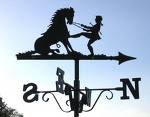 Random House has been reluctant to adopt the agency model that many of the other big publishers have jumped into. Some commentators have been a bit surprised by this, but Mike thinks otherwise. Here’s part of what he says:
Random House has been reluctant to adopt the agency model that many of the other big publishers have jumped into. Some commentators have been a bit surprised by this, but Mike thinks otherwise. Here’s part of what he says:
Although it is certainly possible that iPad book sales will be startling right out of the box, that’s not really likely. Unlike the Kindle, which is purchased by consumers solely for the purpose of reading books, the iPad will attract customers for all manner of reasons and, actually, reading books would be pretty far down the list for most people. Although there are pockets of skeptics, I’m sure most publishing people accept that the iPad can grow into a very robust bookselling channel but it isn’t clear how long that will take or whether narrative text will be as much a beneficiary of the device as books that are more complex presentations of words and pictures.
In the short run, which from this seat looks like some months, if not a year, Kindle and Amazon are still likely to be the leader in ebook sales, and other established ereader platforms that are optimized for text (Nook, Sony Reader, the new ereader from Kobo) will remain important. By holding themselves out of the new channels, continuing the current policies of “wholesale” discounting, and allowing the retailers to set prices, Random House will be maximizing their short-term sales and profits. Assuming they maintain their publisher-established prices near their current levels (and why would they not?), Random House will collect more money for each ebook sold than their competitors do while the public will will pay less for each Random House ebook they buy than for comparable titles from other publishers.

































